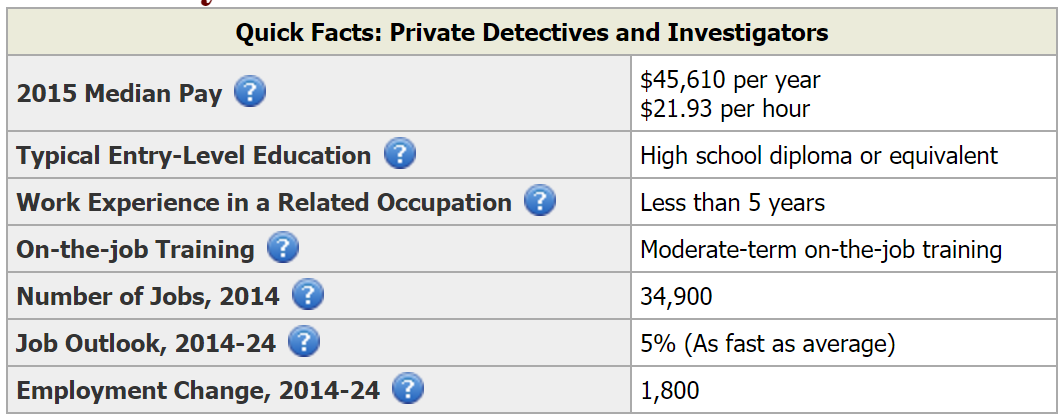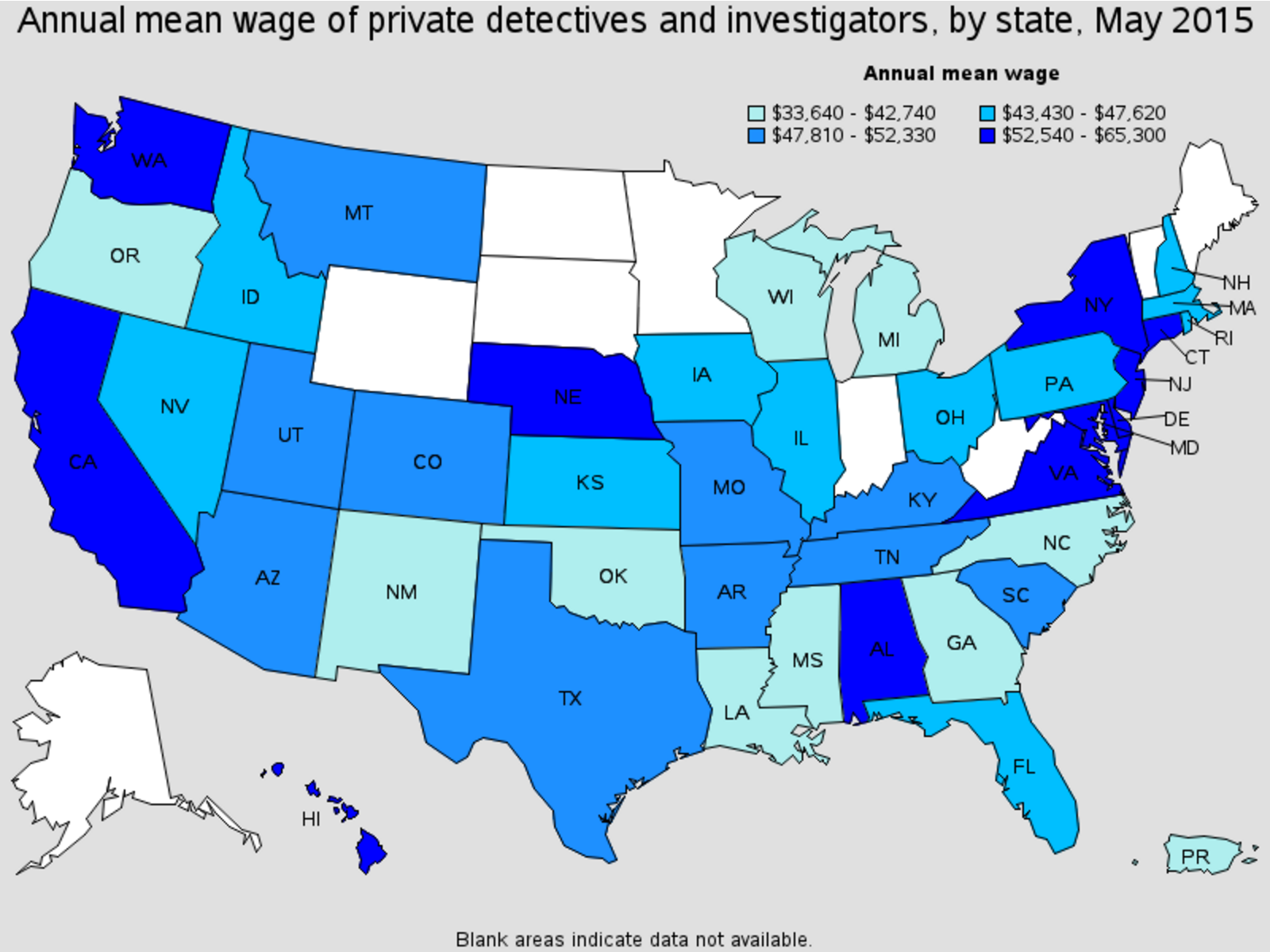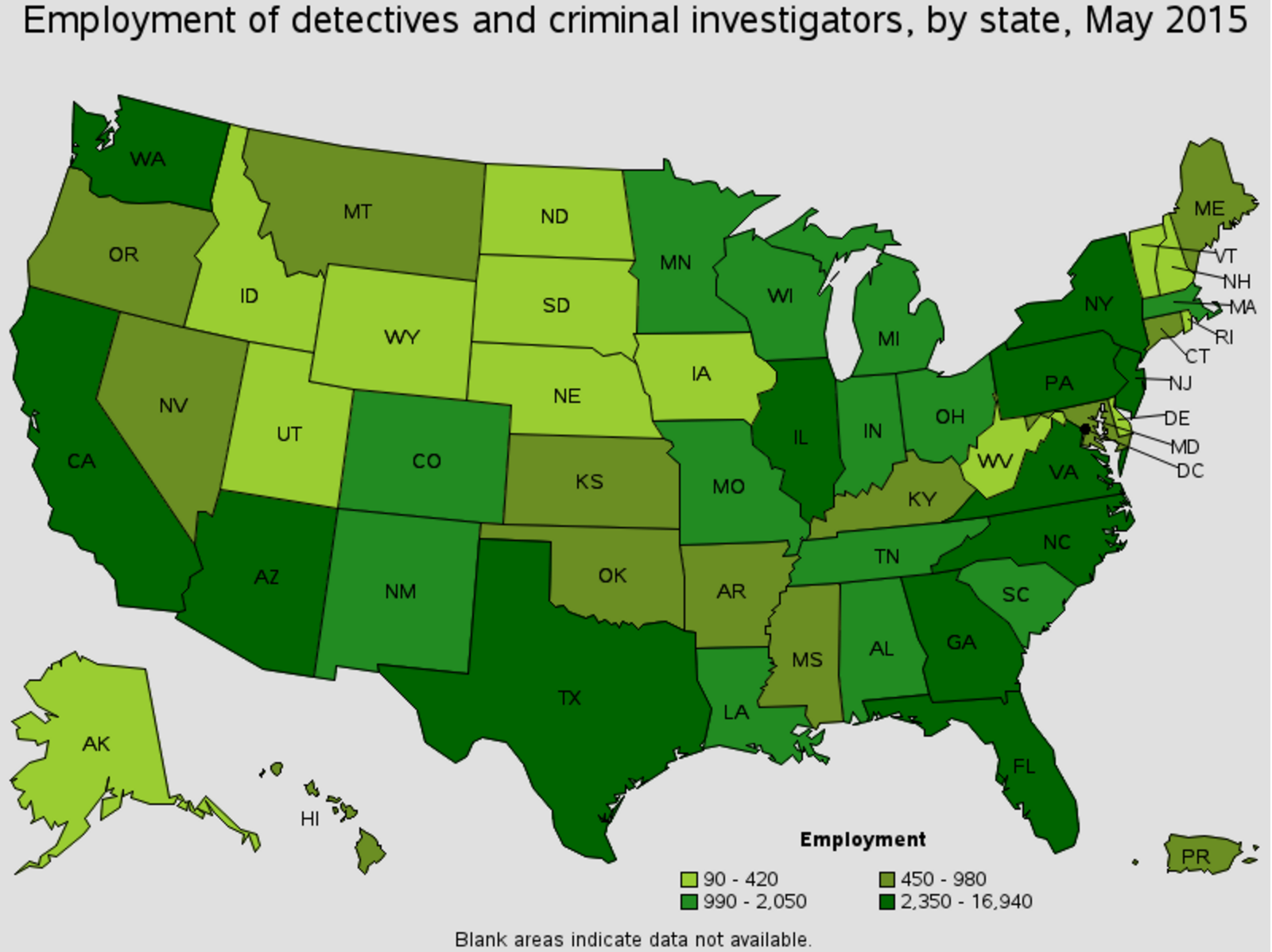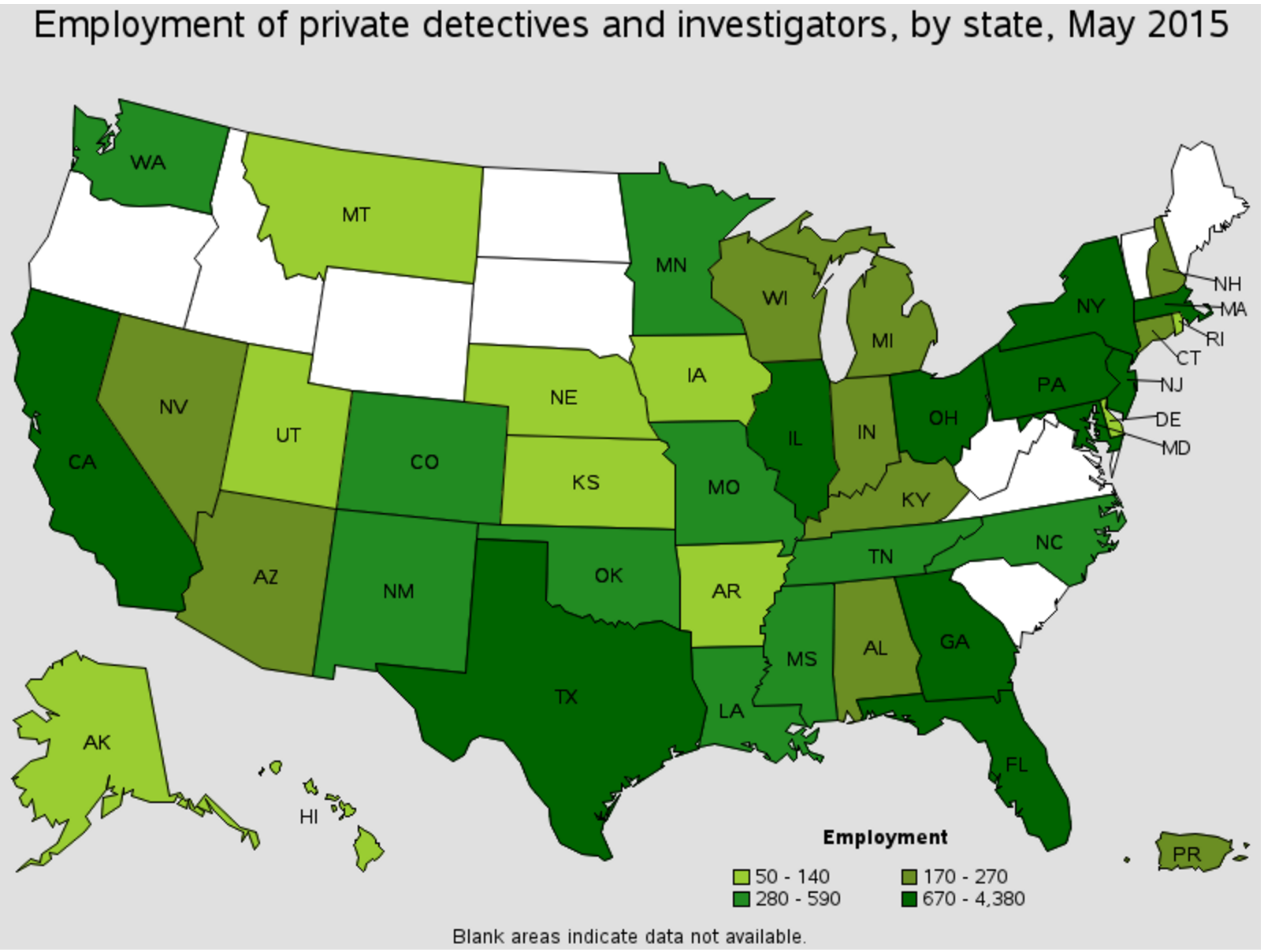Growing up watching detective serials and movies, everyone wants to become a detective. The thrill of deducing never really leaves us especially after getting to know the character of Sherlock Holmes. However, somewhere along the way, we forget this dream of ours and work towards more “realistic” goals. In recent years, due to the increased rate of crime, there is a greater need for detectives to solve them. This is where some police officers step up and exhibit the Sherlock Holmes in them. You will find some information about being a detective if you still want to become one.


Table Of Contents
- Average Detective Salary
- Detective Career Outlook
- How To Become A Detective
- Detective Job Description
How Much Does A Detective Make
The basis of a detective’s salary at first will depend on his or her employer. Usually, a state employed investigator has higher earnings compared to a private one. This is because a private detective has intermittent work while the state employed has a steady work. A state employed detective earns a national average of $76,000. The average salary for a private detective is around $45,000 only. We shall discuss factors affecting a PI’s salary later. Let’s take a look at the factors affecting a state employed investigators’ salary at the moment.
[asd_program_button /]Population Size
The income of a detective depends on the population of a city the same to that of the police officers. If the city is more populated, then the number of cases that need to be handled also rises. Therefore, the salary increases as well. The crime rate also affects the salary of an investigator. For instance, someone in the LA police department will get an average salary of $44,000 to $88,000. Whereas, a member of the Miami Police department usually get $86,000 to $107,000 salary.

Location of job
Crime rate and population of the place are closely related to the location. However, cost of living is another factor to consider. If the place has higher cost of living, the detective’s salary will also be higher. This is true with the case of private investigators as well. District of Columbia, Alaska, and New Jersey has 6-figure salaries and District of Columbia can pay as much as $116,000.
Educational degree
A high school degree is sufficient for those who want any police job except for the federal level. States have different rules but a higher education certificate is not necessary in some states. However, officers and detectives are paid more if they have a degree after high school as there are states and departments who consider higher education important. This may be an associate’s, bachelor’s or even a master’s degree. Depending on your degree, you might be paid more.
Number of years in the field
Like any other job, you will get earn as an investigator if you stay in the field long enough. Usually, people see an increase of up to $15,000 with 20 years of experience if they do not get promoted. However, with promotions, if you reach the post of Police Chief, you can earn about $180,000 annually.
Litchfield Private Investigators
A private investigator’s salary depends on the number of cases he or she takes and solves. The factors that affect the salary as mentioned above include the location, amount of discretion needed, amount of danger involved, required extra equipment and other many things. Clients usually present their problem to the investigator and then it is up to them to quote a price for the job.

A state-employed detective has a steady income that will increase by various means as described here. The salary of a private investigator cannot be determined and by being famous it can be increased. Now that you have the financial facts, you can decide which path to choose.
Litchfield Detective’s Career Path
First thing first, we will be talking about career growth in this field. In 2015, the recorded public detectives or criminals investigators are about 106,000. On the other hand, there were only about 30,000 private investigators holding a job at the same time. Private detectives have grown for about 5% in the industry. This goes to show that by 2025, 1,500 new jobs will be opened. This is the same growth rate of 5% in different sectors. For public investigators, this is only 4% of the figure. Meaning to say, in 2025 it is expected that there will be 4,000 more jobs as a criminal investigator. This is also considered as the average growth rate.
[asd_program_button /]The steady increase in employment is mainly due to the increase in population. As the population increases, more people need to be protected and more criminals need to be caught. However, with stricter laws and more advanced technology being use, the crime rate isn’t increasing that significantly. Thus, both the phenomena almost balance each other out leading to an average growth in both these careers.

In terms of location, Texas, California and New York have the highest number of Criminal/Law Enforcement Investigators. There are more employments in Western states and Texas compared to the eastern part. Private detectives in California, Texas and Florida with the southern part are higher in number compared to the northern ones.
Let’s move on to the industries that hire most of these two professionals. Criminalinvestigaors are being hired mostly by The Local, State government and the Federal branch. Security Services, Consulting services are the ones who usually hire private detectives and the local government need them for consultation on a few cases.
Financially speaking, criminal investigators do get paid more than private ones. Their annual average salary is $80,000 (Criminal investigators) and that of Private investigators is around $52,000. When combining the aspects of geography and finance, the District of Columbia, Alaska, and New Jersey is paying most the Public investigators. It is in Alabama, Nebraska, and New Jersey were private detectives are paid most.
Comparing with different industries again, we see that for private industries, the most employing industries do not pay the highest. Private detectives are paid most in Electromedical, Navigational, Power generation, Metal Product forming and other such industries because of the most sensitive information that needs to be protected. Moving on to Public Investigators, federal agencies, postal services, and educational institutes pay the most.

How can You Qualify as a Detective In Litchfield
Keep in mind that there are two kinds of detectives. There are private investigators that the general public can hire to investigate on certain things. There are those who are government employees and after being promoted as a police officer gets the post. Here we shall explore both the avenues.
[asd_program_button /]Complete High School
A detective is generally a police officer who has been promoted to that position because of his or her skills of deduction. Thus, a general way in becoming a detective is to first complete high school and get into the police academy to become a police officer. To become a private investigator, a high school degree is a must too.
Earn a Bachelor’s degree
In most cases, enlisting in the police force won’t require a bachelor’s degree. Although some officers would like to have other means of employment right after retirement. However, if you aspire to be a detective or land a job on federal level, you will need a bachelor’s degree.
Many institutions require applicants to have a bachelor’s degree in law, criminal justice or psychology to become a detective. If you have an associate’s degree, you will need at least 5000 hours. On the other hand, someone with a bachelor’s degree needs only 4000 hours of training.
Get enough experience
To become a professional detective (not employed by the state), you need to have some professional experience as an investigator. There are many ways to get this. However, the most common way is to be employed by the government first. You will be regarded as a person with experience if you worked as a criminal investigator or an arson investigator. Other than these, you can also choose to Public defender’s office investigator or a licensed repossessor.
Depending on the state you are applying in, the requirements of experience change. There are some that only require 3 years of experience, but some might need at least five.
Own a gun legally
If an investigator doesn’t have a firearms permit, he won’t be allowed to carry his firearm. Some firearms will need you to undertake a full training course in order to get your permit. Therefore if you want to own a firearm while working as an investigator, completing the training course is necessary to get your own permit.
Undergo a New Hampshire licensing test
Once you have fulfilled the requirements, you will need to take a state licensing examination. During the exam, you will need to answer questions in multiple choice, usually regarding about state laws and several other procedures. Those who are looking to be a private detective will need to take this test. After passing this test, you are officially a private investigator with a license.
Get New Hampshire Insurance
Since investigating can sometimes be a dangerous line of work, it is important to get insurance done. Basically, this is a medical insurance worth $10,000. However, it is important to also get a higher amount if you carry a firearm since you need to protect yourself from greater dangers and insure the gun itself.
Complete all these steps and then voila! You can now start living the detective life you always wanted. However, don’t forget that being a detective would mean exposing yourself to danger. If you are still up for it, find out all the education requirements in detail and get started on them right away!
Responsibilities of Being a Detective in Litchfield
Crime Scene Investigation
It will be a detective’s duty to carefully assess a crime scene and come up with the most sensible deduction. The detectives find and bag evidence at the scene of the crime. They will need to keep anything suspicious that might lead to solving the case. To help them deduce a lot of things more quickly and easily, the forensic department will sometimes offer them assistance. To collect more clues and evidence, detectives will need to go door to door and ask any possible eye witnesses.
[asd_program_button /]Criminal Research
One of the core aspects of a detective’s duty is doing research and groundwork regarding previous cases. They do so to gain more knowledge about criminal behavior and identify patterns that people usually follow. This involves looking into previous case records to allow them to have an insight regarding the behavior of the criminal. In cases of serial killers or ‘copycats’, research helps a lot. This is also applicable when it comes to knowing what tactics a drug cartel is up to. Through the help of general research, it will be a lot easier for detectives to identify the culprit or make any accurate deductions.
Narrowing down suspects
The goal of a detective’s job is to bring justice to light and bring the culprit to justice. However, they will need to come up with a list of suspects first. The list could be long, including up to a hundred people, or short – sometimes none at al. They create this suspect list by drawing conclusions from the evidence gathered at the crime, eyewitnesses, research and a bit of criminal/forensic psychology. The list will then be narrowed down by interrogating suspects one after another. After they narrow it down as much as possible, they collect hard evidence or get the suspect to confess to the crimes.
Testifying In Court
Lastly, detectives will see to it that justice is served properly. The court will sometimes summon the detective to the court to aid with the process. They either narrate a possible scenario of how the crime was committed, describe how the evidence incriminates the suspect or provide their expert views on certain topics. Sometimes, the detectives are also required to escort the culprit to jail.
Litchfield Private Detectives
Basically, the above mentioned roles are the responsibilities that detectives carry. Keep in mind that the job of a private detective isn’t as easy as it seems. Supposedly, detectives should meet their client’s needs regardless of how difficult it might seem, especially in terms of research. However, they are allowed to only bend certain laws to a minimalistic extent to help them complete their duties. A private detective is usually hired to perform background checks, keep a check on the actions of certain people, track finances, collect evidence against someone or work of similar nature. They should never act in a way that they can be easily recognized as a detective in public. Moreover, arresting someone is out of their jurisdiction.
managed to get a most things right. But the jobs that these detectives (private and public) must undergo daily are stressful beyond comparison. They are never displayed on portrayed on the media or anywhere else. Supposedly, they should carefully collect any clue and evidence since they carry such heavy responsibility on their shoulders. If the job still has you intrigued, then find out how long it takes to become a detective now!
